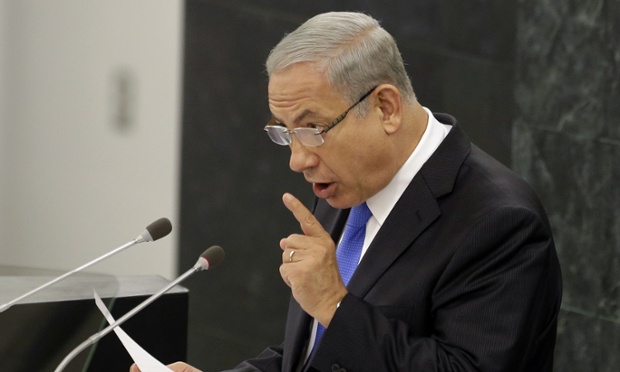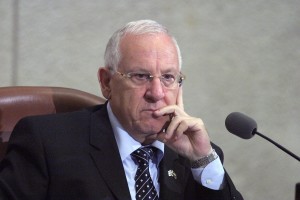by Marsha Cohen
For months, top Israeli intelligence sources have been providing Prime Minister Benjamin “Bibi” Netanyahu with assessments that ought to make him welcome the progress being made at the most recent negotiations in Geneva, instead of, as one prominent Israeli journalist put it, a “party-pooper.”
Last month, days before his visit to the U.S., Netanyahu received a report from the head of Israel’s Military Intelligence (AMAN), Major General Aviv Kochavi. Kochavi’s assessment described the changes in Iran’s internal politics since Hassan Rouhani’s election as president not only as real, but “significant” and “strategic,” according to Barak Ravid of Haaretz: “In particular, Kochavi cited the increased strength of the moderate faction and the fact that 51 percent of the public voted for Rouhani, who was not the preferred candidate of Supreme Leader Ali Khamenei. Kochavi also based his analysis on the stated intention of Rouhani and his cabinet to promote internal reform, increase the country’s openness to the West and end the economic sanctions on Iran.”
The position paper by Israel’s top military assessor stated that the process of change sparked by Rouhani’s victory s “cannot be ignored,” according to Ravid. Netanyahu ignored it. Although Netanyahu received Kochavi’s assessment a few days before he left for the U.S. in late September, the Israeli Prime Minister disregarded it entirely in his speech to the UN on Sept. 30, in which he vilified Rouhani as nothing more than a “wolf in sheep’s clothing” who was no different than his predecessor, Mahmoud Ahmadinejad. In the numerous interviews he gave during and after his visit to New York, Netanyahu complained that all Iranian presidents, whether hardliners or moderate, were all alike, since they served “that same unforgiving creed, that same unforgiving regime,” implicitly calling for regime change in Iran.
Kochavi didn’t question that Iran has a nuclear weapons program. According to Kochavi, the objective of that program has not changed: “Iran still seeks to reach the status of a nuclear threshold state,” in which it could manufacture a nuclear bomb fairly quickly, if and when it decided to do so.” That assessment, however, is a long way from Netanyahu’s hyperbolic insistence that “Iran is developing nuclear weapons.”
Even before the Iranian election in June, Kochavi had been much less histrionic than Netanyahu in his evaluation of the threat to Israel posed by Iran. Along with other Israeli top military and intelligence officials, Kochavi has thus far opposed Israel attacking Iran. Assessing Iran’s nuclear program in mid-March, Kochavi stated, “At this time 10,000 centrifuges are at work, mainly in Qom and Natanz, enriching 240 kilos of uranium, which is enough to produce between five and six bombs, should the Iranian leader decide to make them.” Nevertheless, when speaking at a security conference in Herzliya, Israel, Kochavi nonetheless pointed out that Iran was being careful not to cross any “red lines.” This differed sharply from Netanyahu’s accusations that Iran has been actively engaged in developing nuclear weapons, and had crossed numerous red lines.
Three months prior to Iran’s presidential election, Kochavi hinted that Israel’s intelligence sources inside Iran were reporting that Iranian strategy was under review.
Another top Israeli national security figure whose view diverges from Netanyahu’s hostile response to any diplomatic approach to Iran is Amos Yadlin, a former chief of Israeli defense intelligence and the currently the director of Israel’s Institute for National Security Studies.
At the end of September, Yadlin issued a communique in which recommended that Netanyahu “adopt a ‘positive approach’ which welcomes effective dialogue and negotiations as tools that are preferable to a military solution to Iran’s nuclear program, but stressed that ‘dialogue is not a goal in itself, but rather a framework for the process, the goal of which is to neutralize the Iranian military nuclear threat’.”
In the Wall Street Journal on Oct. 15, Yadlin co-authored an op-ed which outlined four types of deals that could emerge from Geneva: ideal; reasonable; bad and phased. The “ideal” agreement approximates Netanyahu’s most minimal demands: an Iranian commitment to dismantle its nuclear program, beginning with the closure of its enrichment facility at Fordow and its yet-to-be-completed Arak reactor. Furthermore, Iran would be required to “ship out its entire stockpile of enriched uranium, which today is enough to produce five to seven bombs.” All sanctions would then be lifted against Iran.
Yadlin also outlines a “less good, but still reasonable, agreement” according to which Iran would retain its right to enrich uranium at a non-military level of 3.5-5%. It would also allow Iran to keep “a small, symbolic number” of centrifuges. Iran would have to re-sign and implement the Additional Protocol, which would enable the IAEA to carry out much more thorough oversight of Iran’s nuclear facilities, including suspected sites. Furthermore, all Iranian nuclear activities would be limited to Natanz; the Arak reactor would be rendered non-functional; and Fordow would be closed. Finally, transformation of enriched uranium to fuel rods would have to be done outside of Iran, just in case the Iranians change their mind about wanting to build a bomb at any time in the future.
While not dismantling Iran’s nuclear program, Yadlin insists a “reasonable agreement” would give the UN Security Council sufficient lead time to detect and prevent the development of an Iranian nuclear weapon. “This compromise would prolong the Iranian breakout capacity timeline to years rather than months, and it may well be preferable to bombing Iran’s nuclear program or accepting an Iranian nuclear weapon.”
Yadlin’s idea of a “bad agreement” — easing of Western sanctions in exchange for Iran’s partial limitation of its nuclear program — is on par with the view of most hawks in the U.S. and Israel. Yadlin also doesn’t approve of a phased building of trust between Iran and the West, through a “process of reciprocal, partial steps” unless all current economic sanctions are maintained. “Only after Iran proves its resolve to abandon all the key elements in its military nuclear program should sanctions be lifted, and not a moment before.” Nonetheless, the fact that Yadlin can conceive of, and advocate, a “reasonable”agreement that falls short of “ideal” but nonetheless is not “bad” is worth noting: “Western diplomats in Geneva need to find their way to a reasonable deal if reaching an ideal agreement proves impossible.”
On Friday, Yadlin accused Netanyahu of “crying wolf” about the agreement with Iran. “It seems like he thinks that this is the final agreement — it is not,” Yadlin told The New York Times. “The real judgment of whether it’s a bad deal or an acceptable deal will be in the end of the negotiating period.”
Former Mossad Director Ephraim Halevy not only has publicly opposed an Israeli attack on Iran as anything but a last resort; he is a longstanding supporter of a diplomatic solution to the Iran nuclear issue. In September of 2012, Halevy told Haaretz‘s Ari Shavit that Israel needed to understand the Iranian perspective:
The basic feeling of that ancient nation is one of humiliation. Both religious Iranians and secular Iranians feel that for 200 years the Western powers used them as their playthings. They do not forget for a moment that the British and the Americans intervened in their internal affairs and toppled the regime of Mohammad Mosaddeq in 1953. From their perspective, the reason why, to this day, there is no modern rail network and no modern oil refineries in Iran is that the West prevented that. Thus, the deep motive behind the Iranian nuclear project ? which was launched by the Shah ? is not the confrontation with Israel, but the desire to restore to Iran the greatness of which it was long deprived. I believe that if the West could find a way to propose to Iran alternative methods to acquire that sense of greatness, Iran would forsake the nuclear road. If Iran were offered trains and oil refineries and a place of honor in regional trade, it would consider this seriously.
A month later, in an interview with al-Monitor‘s Laura Rozen just before the U.S. presidential election, Halevy defended President Obama’s willingness to negotiate with Iran as ” very courageous.” He also criticized Netanyahu for “invoking Auschwitz twice a week.” The interview was published amid rumors that the United States and Iran had agreed to hold direct talks on Iran’s nuclear program after the US presidential elections.
Halevy sees the “end game” of the negotiations with Iran as being of primary importance and urgency. In what appears to be an argument for a speedy wrap-up of an agreement, Friday’s New York Times quoted Halevy as saying, “The more you enter stages, the less you can be certain that you will get what you need in the end.” For Halevy, the desired end of the Iran negotiations would be an Iran without nuclear weapon capability that has reconciled itself to Israel’s existence. Halevy told Rozen in an interview last week:
“IF, if, the nuclear file is closed, and sanctions removed, it will bring economic relief…[and] a renewed view from Tehran of the opportunities the world is offering. And then, if there will be a desire to move beyond the nuclear issue, then the Iran regime will be able to turn to the public and say, ‘we should no longer be in the business of fear mongering. If we want to move forward with the US, it will be difficult while maintaining a state of belligerency against one of the US key friends and allies.’”
Ralph Ahrens of the Times of Israel reports that Doron Avital, a former commander of Israel’s elite reconnaisance unit Sayeret Makhal and more recently member of Israel’s Parliament (Knesset) from the Kadima party, discussed Iran’s nuclear program with a former general from Iran’s Revolutionary Guards at a a recent academic conference held at a French chateau.
“There’s been a serious shift toward the West,” Avital told The Times of Israel, “and if I take everything that he said and corroborate it with what I heard recently from [military intelligence commander Maj. Gen.] Aviv Kochavi and [newly retired national security adviser] Yaakov Amidror, then I think there has been a strategic shift and not just a tactical one.”
Avital implied that his attendance at the conference had been with the knowledge and tacit approval of Israel’s Ministry of Defense. “I have friends in the political and defense establishments and of course I updated them before leaving and after returning.” The Defense Ministry declined to confirm any knowledge–or interest–in Avital’s attendance at the event.
Another Times of Israel article by Lazar Berman on Oct. 31 reported that senior Israeli officials were said to have met “with representatives from an array of regional states — including Iran — and other major powers” in Switzerland. The topic of the meeting was the convening an international conference on making the Middle East a region free of weapons of mass destruction.” Israel’s Foreign Ministry refused to comment on the report.
Taken together, these under-publicized reports indicate that the views of Iran held by many well-informed Israelis in the military, defense and intelligence establishment are far more nuanced than Netanyahu’s harsh and histrionic opposition to any but the most maximalist “deal” with Iran would lead one to believe. Unfortunately these assessments seem to be unknown to members of Congress, as well as to spokespersons for “pro-Israel” organizations and think tanks who are determined to prevent any agreement with Iran or strangle it at its inception.






What ever the outcome, one cannot give Israel a free pass. Why does Israel feel it needs to be the only one in the M.E. with the Bomb? Saudi Arabia either does already or soon will have, so, is that taken into consideration in the context of who does & who doesn’t? If anything, this article seems to legitimize Netanyahoo is not in this reality, but somewhere else.
Many thanks for this clear and informative reporting of the facts, which is necessary for taking any wise decisions. It is journalism at its best.
It is clear that the point at the heart of the dispute between Iran and Israel is not Iran’s nuclear program, but a feeling of mutual demonization and mistrust. However, before those unnecessary hostilities are laid to rest, Israel should know that an Iran that is on friendly terms with the West and has an incentive for cooperation with the West will be much less of a threat than an Iran that feels isolated and threatened. As for Iran, President Rouhani has repeated Iran’s official policy that any agreement between the Palestinians and the Israelis will be acceptable to the Iranian government, and Iran also implicitly endorsed the Arab League Peace Plan to recognize Israel within 1973 borders when the heads of the Islamic Conference Organization, including former President Ahmadinejad, endorsed the plan.
It is time for both sides to tone down their rhetoric and to look for the peaceful resolution of their differences, rather than continue with hostile rhetoric that will only widen the gulf of misunderstanding. Logic dictates that Israel should push for a nuclear agreement between Iran and the West, rather than try to block it.
Mr. Jahanpour is right to observe that the heart of Israel (and Saudi Arabia’s) dispute with Iran is not the nuclear program. In fact, this is why Netanyahu disregards what Kochavi has to say: he agrees with him. He agrees that Iran is not developing nuclear weapons, and that Israel really has little concern that Iran will ever develop one. But the flip side of this fact is that if this is true, Israel has nothing to gain from an agreement, and much to lose.
Like what? The sympathy of the world. Sanctions on the sponsor of Hezbollah, Assad, and Hamas. The direct line to America’s wallet for arms shipments. And perhaps most of all, a massive distraction away from Israel’s creeping appropriation of the West Bank and continued blockade of Gaza.
Saudia Arabia has the same problem. An Iran under sanctions is an Iran constrained and contained. An Iran that was freed of sanctions would be a massively greater threat in the ongoing, 1300-year-old war between Sunni and Shia.
Netanyahu, as well as the Saudis, have made a considered strategic decision that there is no agreement over nuclear issues that could compensate for the benefits to keeping Iran in it’s cage. So the Saudis set out to bribe France to scuttle any deal; the Israelis set out to have AIPAC direct its puppets in Congress to the same end.
There’s no possible deal as long as these two have any say, because there’s no possible deal that would be superior, for them, to continuing the pressure on Iran, if necessary forever.